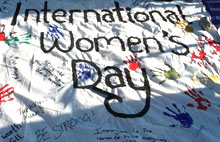 Violence against women remains a socially accepted but hidden issue in many parts of the world. Source: High Definition Photos and WallpapersCairo, 5 March 2013 – International Women’s Day is celebrated annually on 8 March to celebrate achievements and highlight gaps in women and girls’ equality worldwide. The theme of this year’s International Women’s Day is “A promise is a promise: Time for action to end violence against women”.
Violence against women remains a socially accepted but hidden issue in many parts of the world. Source: High Definition Photos and WallpapersCairo, 5 March 2013 – International Women’s Day is celebrated annually on 8 March to celebrate achievements and highlight gaps in women and girls’ equality worldwide. The theme of this year’s International Women’s Day is “A promise is a promise: Time for action to end violence against women”.
The Convention on the Elimination of All Forms of Discrimination against Women, to which most countries in the Region are signatory, commits Member States to ensuring the equitable delivery of reproductive health services and to protecting women and girls against violence, child marriage and harmful practices, such as female genital mutilation.
Article 12 of the Convention states that, “States Parties shall take all appropriate measures to eliminate discrimination against women in the field of health care in order to ensure, on a basis of equality of men and women, access to health care services, including those related to family planning” and “… shall ensure to women appropriate services in connection with pregnancy, confinement and the post-natal period, granting free services where necessary, as well as adequate nutrition during pregnancy and lactation”.
In the Region, poverty, illiteracy, weak health systems, armed conflict and insurgency, malnutrition, early childbirth and gender inequality are all contributing factors which limit the access and rights of women and girls to health.
Disparities in women’s access to obstetric care and other services is evidenced by the huge variations in maternal mortality ratios, from 1000 per 100 000 in Somalia to 14 per 100 000 in Kuwait, despite available health care solutions to prevent women dying unnecessarily from pregnancy-related complications. A woman giving birth in Somalia should be afforded the same right to a safe delivery as a woman in Kuwait. International Women’s Day reminds us of the women who risk their lives when giving birth because they cannot access the technology and health care for a safe delivery. Almost one million mothers and children die each year in the Region from mainly preventable causes.
Millennium Development Goal (MDG) 5, improving maternal health, and the UN Global Strategy for Women’s and Children’s Health are important global initiatives which build on previous commitments by countries and partners to improve women’s rights to health. Ministers of Health of the Region recently furthered their commitment to prioritizing the health of mothers and children and accelerating progress towards achieving MDG 4, to reduce child mortality, and MDG 5 in the high-level meeting on saving the lives of mothers and children. An outcome of this meeting was the Dubai Declaration which noted the widening inequities in access to basic services for vulnerable populations and committed countries to a range of measures designed to improve maternal and child health as key to achievement of development goals.
WHO celebrates achievements made towards women’s health, while recognizing the path to health for all women is not yet complete. WHO continues to prioritize women’s health and to support Member States in fulfilling the right to health of all its women and girls.
Every woman and girl, man and boy, has the right to bodily integrity and security, as well as the right to live without cruel, inhuman, or degrading treatment or punishment. International Woman’s Day compels us to reflect on the women and girls who are denied these rights.
Related links
Convention on the Elimination of All Forms of Discrimination against Women
Joint statement Standing up to the “epidemic” of violence against women


